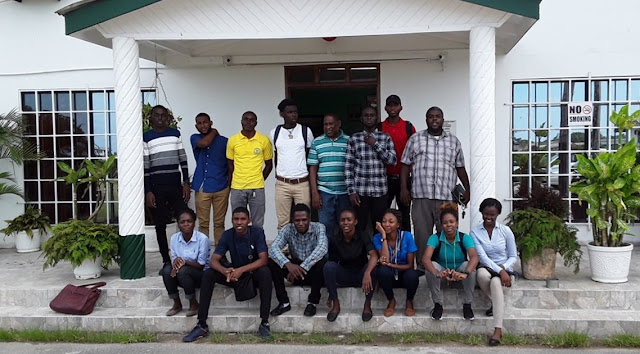Honeybee Disease Management and Apiary Inspection in Guyana
The demand for honey in Guyana has rapidly increased as people seek healthier sweetener options, causing a shortage of beekeepers in the country relative to market demand. To accelerate the entry into beekeeping for aspiring Guyanese farmers, a F2F volunteer was requested by the Guyana Livestock Development Agency (GLDA) to help them train its personnel in disease management and apiary inspection.
The GLDA is the single institution mandated by the Government of Guyana to implement and coordinate the implementation of livestock development activities. It aims to promote greater efficiency in the livestock product industry and the control of animal movement into and within Guyana to prevent the introduction and spread of animal diseases.
Dr. Michael Goblirsch was the volunteer selected for this assignment. Dr. Goblirsch holds a Ph.D. in Entomology from the University of Minnesota where he oversees the Technical Laboratory of the Bee Research Facility and teaches various subjects on beekeeping, such as thermoregulation and hive management. He visited Guyana between October 6th and 20th, 2019.
During the two weeks of his assignment, Dr. Goblirsch worked closely with the lead Apiary Inspector at the GLDA, and he also trained two former Apiary Inspectors, a representative from the Prison System, and 12 recent graduates of the Guyana School of Agriculture, five females and seven males.
He delivered both classroom lectures and field and practical exercises that immersed the candidates in many aspects of honeybee biology. Some of the topics he taught included honeybee life history and development, applied social behavior, identification and best management practices for honeybee diseases and pests, and practical beekeeping such as hive splitting, catching swarms and routine colony inspection.
His trainees had several opportunities to view honeybees in the field by visiting numerous beekeepers with different levels of experience, beekeeping style, and geographic location. Additionally, two beekeepers provided access to their hives for inspection prior to the visit by the students, so the volunteer and the GLDA’s Lead Apiary Inspector could assess what they wanted to demonstrate to the students during their field trips.
Thanks to Dr. Goblirsch’s support, at the end of the assignment GLDA staff, was better equipped to advise new beekeepers on disease management and had a framework for conducting apiary inspections. Additionally, three or four new apiary inspectors were going to be selected from the group of recent graduates that Dr. Goblirsch trained.
All of this will help the host to achieve its goal of increasing its Apiary Inspector Program, and also the presence of beekeeping in Guyana. Moreover, a rise in honey production will strengthen the economy of the country and ensure food security for the Guyanese by making honey more affordable and increasing the abundance of fruits and vegetables pollinated by honeybees.
Dr. Goblirsch commented on his experience: “This assignment gave me the opportunity to work with diverse groups and cultures. Through Farmer-to-Farmer I was able to not just provide training in beekeeping, but also to communicate with the Guyanese people and their culture. I found the Guyanese people to be very welcoming and eager to share their country with me.”




.png)

Comments
Post a Comment